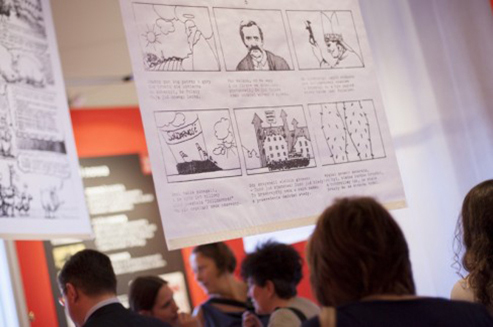Corso Polonia 2014 falls on the joyous 25th anniversary of Solidarity’s electoral victory and the overthrow of communism at the ballot box on 4 June 1989.
“The festival’s programme is devoted to cultural and social life phenomena of Poland in the 1970s and 1980s—globally unique and unknown in Italy—which played a prominent role in Poland’s path to freedom,” emphasised Paweł Stasikowski, Director of the Polish Institute, in his inaugural address. “This year’s edition outlines both the artists who walked this path and those who made their debut in an already free and democratic Poland—the young ones drawing inspiration from the former era but also from the opportunities offered by Poland’s successful transformation,” he added.
The event, which will run until 8 June, was organised by the Polish Institute in Rome under the patronage of the Municipality of the Capital City of Rome. Each year, the festival presents Polish culture in its multiple dimensions and spheres, taking into account the social context and mutual Polish-Italian relations.
The 12th edition’s opening events included a night of reminiscences and an exhibition titled “Underground publications. Think outside the censorship,” which were devoted to Polish underground democratic publishing outfits of the 1970s and 1980s.
Poles and Italians directly involved in running the samizdat in the Polish People’s Republic: Giovanna Alberta Campitelli, Francesco M. Cataluccio, Konstanty Gebert, Tadeusz Konopka, Marek Lehnert, Andrzej Mietkowski, Maria Pałasińska, Jacek Pałasiński and Barbara Toruńczyk, recounted their underground work and interesting experiences.
Professor Jerzy Kandziora of the Institute of Literary Research at the Polish Academy of Sciences introduced the history of the samizdat literature. The meeting was moderated by Professor Piotr Salwa, Director of the Rome Research Centre of the Polish Academy of Sciences, which is the event’s partner.
The exhibition displays, among others, genuine publications produced in 1976–1988 outside the communist censorship. It features both “high circulation” publications, for instance pocket editions of Paris-based “Culture,” as well as those by the illegal Independent Publishing House. Italian visitors can also see unique, well-edited cartoons and children’s stories.
The exhibition’s main attraction is an authentic duplicator. This mobile printing machine, illegally used by the democratic opposition in the Polish People’s Republic, is an exhibit transferred specially for the occasion from Warsaw. With it, you can move back in time and space from central Rome to an underground print shop in the 1980s.
The festival’s highlight will be a multimedia Freedom Party #PolskaFree25, to take place on 7 June at Circolo degli Artisti, Rome’s biggest club. This venue in 2014 also celebrates its 25th anniversary under an equivocal motto “25 years of Winners.” The event, which will feature Polish and Italian performers, was organised in collaboration with the Granary of the Polish Rock project of the Regional Museum in Jarocin. It will be preceded by a promotional campaign and a competition on social media about the #PolskaFree25 hashtag, which is used on Twitter and Facebook to tag posts concerning the 25th anniversary of the 1989 breakthrough in Poland.
“We have invited two generations—pre-1989 and post-1989 ones—to celebrate the 25 years of a free Poland together. We want to share our jubilation over the victory with our audience and recall that it triggered epoch-making changes throughout Central and Eastern Europe, including the fall of the Berlin Wall,” underlined Director Stasikowski.
Source: Ministry of Foreign Affairs and Polish Institute in Rome


